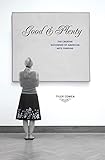Good and Plenty : The Creative Successes of American Arts Funding / Tyler Cowen.
Material type: TextPublisher: Princeton, NJ : Princeton University Press, [2009]Copyright date: ©2006Edition: Course BookDescription: 1 online resource (216 p.)Content type:
TextPublisher: Princeton, NJ : Princeton University Press, [2009]Copyright date: ©2006Edition: Course BookDescription: 1 online resource (216 p.)Content type: - 9780691146263
- 9781400827008
- 700.797 700.7973
- NX735.C68 2006
- online - DeGruyter
- Issued also in print.
| Item type | Current library | Call number | URL | Status | Notes | Barcode | |
|---|---|---|---|---|---|---|---|
 eBook
eBook
|
Biblioteca "Angelicum" Pont. Univ. S.Tommaso d'Aquino Nuvola online | online - DeGruyter (Browse shelf(Opens below)) | Online access | Not for loan (Accesso limitato) | Accesso per gli utenti autorizzati / Access for authorized users | (dgr)9781400827008 |
Browsing Biblioteca "Angelicum" Pont. Univ. S.Tommaso d'Aquino shelves, Shelving location: Nuvola online Close shelf browser (Hides shelf browser)

|

|

|

|

|

|

|
||
| online - DeGruyter Just Silences : The Limits and Possibilities of Modern Law / | online - DeGruyter Outside Ethics / | online - DeGruyter The Invisible Safety Net : Protecting the Nation's Poor Children and Families / | online - DeGruyter Good and Plenty : The Creative Successes of American Arts Funding / | online - DeGruyter The Ladder of Jacob : Ancient Interpretations of the Biblical Story of Jacob and His Children / | online - DeGruyter American Mythos : Why Our Best Efforts to Be a Better Nation Fall Short / | online - DeGruyter The Seduction of Culture in German History / |
Frontmatter -- Contents -- Acknowledgments -- 1. Warring Perspectives -- 2. Indirect Subsidies: The Genius of the American System -- 3. Direct Subsidies: Are They Too Conservative? -- 4. Copyright and the Future of Decentralized Incentives -- 5. Toward a Beautiful and Liberal Future -- Notes -- References -- Index
restricted access online access with authorization star
http://purl.org/coar/access_right/c_16ec
Americans agree about government arts funding in the way the women in the old joke agree about the food at the wedding: it's terrible--and such small portions! Americans typically either want to abolish the National Endowment for the Arts, or they believe that public arts funding should be dramatically increased because the arts cannot survive in the free market. It would take a lover of the arts who is also a libertarian economist to bridge such a gap. Enter Tyler Cowen. In this book he argues why the U.S. way of funding the arts, while largely indirect, results not in the terrible and the small but in Good and Plenty--and how it could result in even more and better. Few would deny that America produces and consumes art of a quantity and quality comparable to that of any country. But is this despite or because of America's meager direct funding of the arts relative to European countries? Overturning the conventional wisdom of this question, Cowen argues that American art thrives through an ingenious combination of small direct subsidies and immense indirect subsidies such as copyright law and tax policies that encourage nonprofits and charitable giving. This decentralized and even somewhat accidental--but decidedly not laissez-faire--system results in arts that are arguably more creative, diverse, abundant, and politically unencumbered than that of Europe. Bringing serious attention to the neglected issue of the American way of funding the arts, Good and Plenty is essential reading for anyone concerned about the arts or their funding.
Issued also in print.
Mode of access: Internet via World Wide Web.
In English.
Description based on online resource; title from PDF title page (publisher's Web site, viewed 30. Aug 2021)


